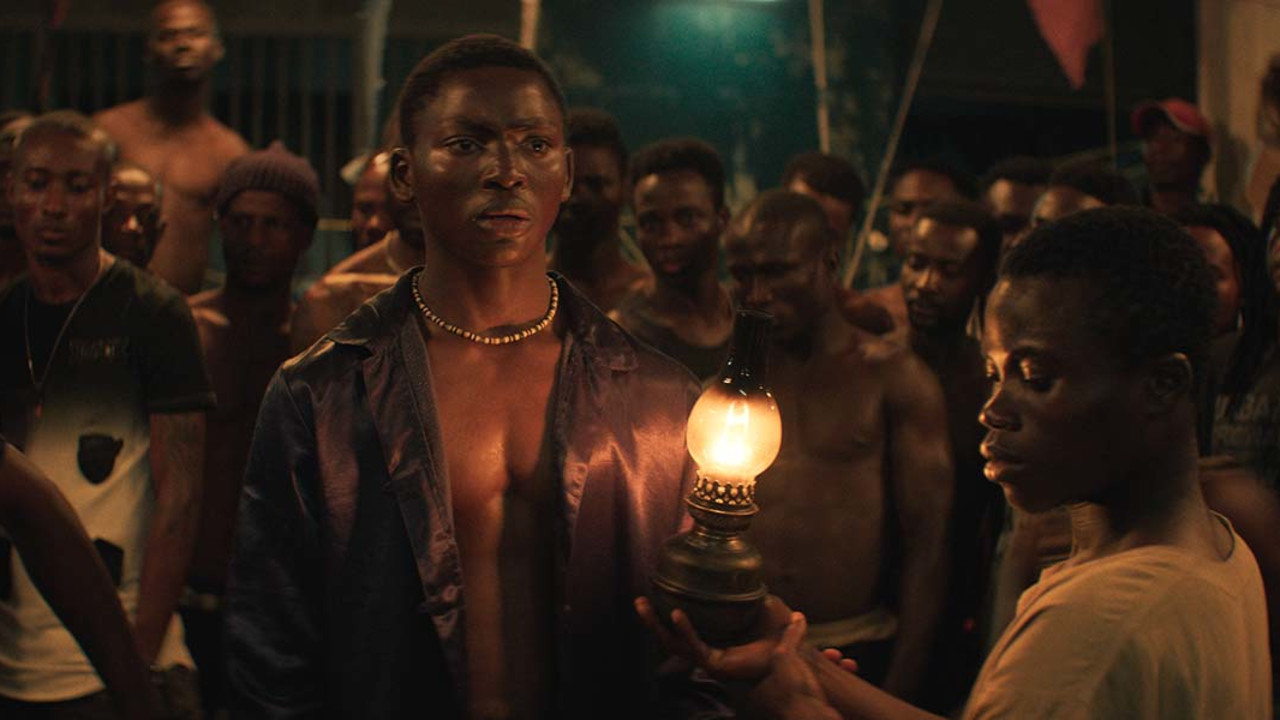Shiva Baby (Seligman, 2020)

We’ve all been there: family gatherings with relatives you barely see, who hurl a barrage of prying questions at you while making a few underhanded observations about your looks or your career (or lack thereof). Shiva Baby doubles down on that discomfort—and then some—by planting aimless college student Danielle (Rachel Sennott) in the middle of a shiva that she’s attending at the behest of her parents (Polly Draper and Fred Melamed). What her parents don’t know is that Danielle has been supplementing her education (and income) by seeing men in her downtime, and worlds threaten to collide when one of those men (Danny Deferrari) appears at the shiva with wife and baby in tow. Between fending off overly personal conversations, managing the buffet spread, awkwardly interacting with ex-girlfriend Maya (Molly Gordon) and panicking about her sugar daddy’s unexpected presence and its potential ramifications, Shiva Baby becomes one prolonged anxiety attack of a film that director Emma Seligman peppers with darkly comedic sensibilities.
Make no mistake, it’s a strong and assured debut feature, suffused with a relatable angst about our current generation’s pressures to find stable footing in today’s labour market. I liked that Seligman does not stigmatize Danielle’s sex work, and instead sees the problem in her culture’s overly-conservative and success-driven mindset (which also extends to Danielle’s bisexuality, with her mom constantly needling her not to “make a scene” with Maya). The shiva becomes a metaphorical battleground of clashing values: Danielle’s progressive, radical ways to make a viable living for herself versus the traditional expectations of those around her, and how trying to navigate the two can be a messy, often frightening experience.
The film does run into difficulty managing to sustain its runtime (Seligman expanded the story from an earlier short), and the payoff is perhaps not as satisfying as we expect it to be, apart from a promising moment of tenderness for Danielle. What strives for memorability does not always hit the mark, though Seligman valiantly tries. Nevertheless, Shiva Baby does not falter in turning what ought to be a solemn Jewish tradition into a fearless, often entertaining roller coaster of emotions and social commentary that many audiences will eat up with relish.

Night of the Kings (Lacôte, 2020)

Set in the expansive MACA prison in the middle of an Ivorian forest, Night of the Kings weaves together a series of contrasting narratives. The first centers around the prison’s latest inmate, a young man dubbed the “Roman” by the prison’s grizzled kingpin, Blackbeard, who controls the inmates instead of the powerless guards. Frail in health, but not less fierce, Blackbeard tasks the Romans he crowns to regale the other inmates with a story on the night of every red moon—but once they finish their tale, they must die. The latest Roman, intimidated by the prison’s code of bloodlust and savagery, must show his savviness if he wants to make it through the night and stay alive.
And so the second narrative unfolds, as the new Roman chooses to tell the history of the infamous gangster Zama King, utilizing his griot lineage to great effect to transform the dead Zama King’s story into a expansive legend that melds the modern day with the mystical past. Included in this is a sumptuous magic realist sequence that gives Philippe Lacôte the liberty to showcase his film’s connections to such texts as the One Thousand and One Nights. But between the Roman’s imaginative storytelling, the film never loses sight of the machinations that echo through the MACA’s cavernous corridors, as a struggle for power commences with Blackbeard’s imminent downfall. Lacôte is not merely interested in Roman’s survival strategy, but with the competing strategies of all the inmates at large as they try to stake their claim in an uncompromising realm.
This approach does fracture the narrative’s linearity, which may bewilder a less invested viewer, but for me, the slow broil of the film’s world-building is always sharp and rife with unpredictability. When coupled with the aural tapestry of the West African oral tradition and Lacôte’s visual acuity, Night of the Kings becomes a rewarding look into the interconnections between mythmaking and one’s own immediate historicity.

No Ordinary Man (Chin-Yee & Joynt, 2020)

Late jazz musician Billy Tipton became the subject of tabloid sensationalism after his death in 1987 when it was revealed that he’d been born a woman and lived most of his life without disclosing his secret—even to his loved ones. After his family was put through the talk show circuit and his life was chronicled in a deeply problematic biography by Diane Middlebrook, which framed Billy’s gender identity as a deceptive act of passing, filmmakers Aisling Chin-Yee and Chase Joynt seek to rescue his legacy from these violent misconceptions with this immersive documentary about his life—and they succeed. Not only do they succeed, but they offer a singular work that squarely centers transmasculinity and its complex history vis-à-vis commentary from a variety of renowned trans scholars, activists and artists, including Marquise Vilsón, Scott Turner Schofield, Susan Stryker, C.Riley Snorton, and Thomas Page McBee, among others.
Without any surviving footage to showcase of Billy in his heyday, Chin-Yee and Joynt invite these figures to “audition” in the role of Billy for a speculative film about his life, allowing them to commune with his past and, through scripted dialogue, find greater understanding and empathy for Billy’s plight as a transmasculine man in an era where transmasculinity was still an unknown concept. One scene, for instance, in which the artists learn about Billy’s encounter with another trans man in his early days as a musician, cuts deep as the realization dawns that Billy may not have had the kinds of role models the trans community have now. For while there is no doubt trans people existed in Billy’s time (and the doc elegantly outlines the close connections between what constitutes modern transness and transness of the historical past), they hid in the margins and kept their gender nonconforming status a secret. Like Billy, they could not live their truth openly precisely because society had not reached the levels of acceptance about trans identity that it has now. And even now we still have a long way to go.
Perhaps the doc’s most moving quality is the way Billy’s role as a trans trailblazer is revitalized. The talking heads here all have great and sincere respect for Billy’s brave insistence on living the life he wanted and believed in, later communicating Billy’s importance to them to his adult son, who took care of Billy at the time of his death. It’s a simple moment of grace, but the look of quiet gratitude that Billy’s son shows speaks volumes about the film’s impact, and indeed Billy’s impact. Together with its concise, leveled discussion about trans representation and authenticity, the doc forges itself as a text of great import for the trans community that I hope will be shared widely and broadly.

Nomadland (Zhao, 2020)

Frances McDormand’s Fern, for all her generosity, can be a tough nut to crack. Several characters in Nomadland seek to understand her reticence to stay put, hunker down, buy a house—even start a new family. Displaced from the small mining town of Empire, Nevada after the last decade’s recession closed it down for good, and after losing her husband to cancer, Fern moves from small job to small job in her van (which she’s nicknamed Vanguard), self-sufficient to the bone. The American frontier and its rocky vistas are her new soulmates; the people she meets along the way, little ripples that etch into her solitude, but do not greatly disturb it. She smiles, waves, offers coffee or a sandwich. She converses with those who share the road with her, absorbing their stories like dew on dusty crags, her usually flinty eyes burning with attention and empathy. She is vessel-like in some ways, taking in the secrets and rigors of nomadic life like a dutiful student without revealing too much of her own heart. We, too, wonder at times about what bubbles beneath Fern’s exterior, and it’s a testament to McDormand’s skills as an actress that we get quite a lot without being fed too much, for, in truth, the excess is far from needed.
McDormand economizes, as does Chloé Zhao, cutting scenes dexterously while lingering on landscapes that engulf and dwarf those in view. Time passes unannounced with the regularity of road signs; for a moment it’s Christmas, and an hour later it’s already another New Year’s Eve, a whole year gone in a flash. Time, though, is not really of the essence. Stars shine irregardless of how long their light takes to reach us. Rocks hold the secrets of millennia, but what we care about is how circumstance shapes them through that time. Nomadland is much like that. It may flicker though Fern’s transient existence with episodic regularity, but the kernels of its beauty lie in the collective expanses of that journey, which build and build with quiet intensity. Zhao eschews big moments in favor of a string of small ones, and the result is a resilient meditation on mortality, obsolescence, and accepting the fringes of existence instead of balking at them. An ode to making new what society may consider out of date by communing with the timeless essence of the land around us. Truly seeing it for the first time so we can see ourselves for the first time, too.
Zhao’s elegant, wise offering to us could, perhaps, use a little more grit and nastiness to roughen up its tranquility. The road life is, after all, a perilous one, and not all the people on it can be trusted like they are here. At times I did wish for more immediate conflict than Fern’s small quivers of longing to return to being moored to permanence and stability. At the same time, however, it’s clear Zhao wants us to lose ourselves in something that goes beyond realism. Something that is clear of such encumbrances to make way for the transcendental. She doesn’t entirely pull it off, but what she achieves is still so affecting and nourishing that it hardly matters. She’s given us something special, and for that she will rightly go the distance.


